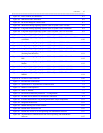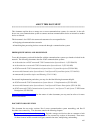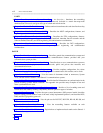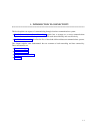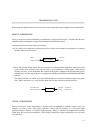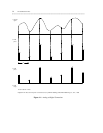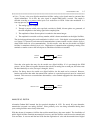xviii ABOUT THIS DOCUMENT
_ ___________________________________________________________________________________________________________________________
_ ___________________________________________________________________________________________________________________________
_ ___________________________________________________________________________________________________________________________
PART I
• Chapter 2 — Communications System Networking — An Overview— Introduces the networking
software packages that are used to implement a PBX network. Included is a matrix that maps node
administration to the tools used given the type of switch and switch version.
• Chapter 3 — Tandem Tie Trunk Networks — Defines tandem tie trunk networks and describes how they
operate.
• Chapter 4 — Main-Satellite/Tributary (MS/T) — Describes the MS/T configurations, features, and
engineering and administration considerations.
• Chapter 5 — Electronic Tandem Network (ETN) — Describes the ETN configurations, features,
interactions with other types of networks (including Centralized Attendant Service networks and the
Software-Defined Network), and ETN engineering and administration considerations.
• Chapter 6 — Distributed Communications System (DCS) — Describes the DCS configurations,
transmission facilities, features, feature transparency, and engineering and administration
considerations.
PART II
• Chapter 7 — Data Connectivity — An Overview — Describes general data communication concepts and
capabilities, as well as defines the basic data communications features provided that your
communication system provides.
• Chapter 8 — Data Communications Capabilities — Describes how to use a communications system to
connect data terminal equipment, local area networks, public and private data networks, and
telecommunication hosts.
• Chapter 9 — Data Communications Configurations — Provides template configurations for various
data networking applications, e.g., medical imaging, FAX communication, file transfers, and so forth.
• Appendix A— Related Documents — Lists the names of documents related to DIMENSION, System
75/85, and the DEFINITY Generic 1 and Generic 2 communications systems.
• Appendix B — Timing and Synchronization — Provides detailed information on synchronization in the
private switching systems within a network. This appendix also provides many examples of how and
where synchronization is used.
• Appendix C — Trunking Terms and Trunk Compatibilities — Provides a list of trunking terms and
several tables that identify trunking compatibility between particular types of switches.
• Appendix D — Protocols — Explains the open system interconnect (OSI) protocol model, describes
protocol naming systems, defines some of the most widely implemented protocols, and describes DCP,
DMI, and BX.25 proprietary protocols.
• Appendix E — Lead Designations — Lists the pin-outs for RS-232C, RS-232D, RS-449, RS-366, and
V.35 connectors.
• Appendix F — Networking Features — Lists the networking features available on each
communications system.
• Appendix G — Robbed-Bit AVD (rbavd) — Explains how to implement rbavd trunks on the Generic 1
communications system.
• Glossary
• Index




